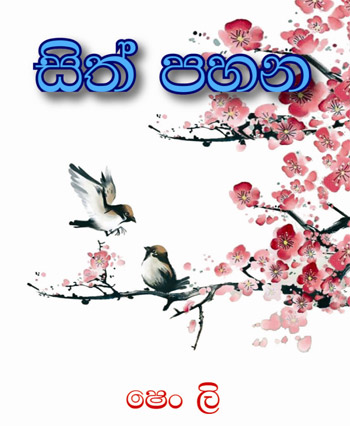Once there were a samanera and a bhikku in a temple. One day the bhikku noticed that the samanera sitting long faced in a corner. He called the samanera and asked him to bring some salt and a glass of water. When the samanera returned, the bhikku asked the samanera to mix a spoonful of salt in the glass of water and drink it. So did the samanera.
“What do you feel now?” Bhikku asked the samanera.
“I feel very uncomfortable nayaka hamuduruwane,” samanera explained the uneasiness he felt after drinking the salt water.
“Then come with me with another spoonful of salt,” the older bhikku took the samanera to the pond in the temple garden. “Now, mix the spoonful of salt in the pond,” the bhikku ordered. When the samanera mixed salt in the pond the bhikku ordered the samanera to drink some water from the pond. “Now take a sip of water from this.”
When the samanera drank water from the pond he felt eased and he explained the feeling to the bhikku.

“Did you notice the difference? You mixed the same amount of salt in both the glass and the pond,” the bhikku stressed.
“When your mind is troubled, make it a pond, not a glass. Then you won’t feel it much,” he explained to the little samanera.
This is a story taken from the new sinhala book, “Sith Pahana”, which is scheduled to be launched on the seventh of national literacy month, this year. The speciality of Sith Pahana is that it is written in Sinhala by a Chinese. The author of the book is Ms Sheng Li --the current director of Sinhala service of China Radio International. “Sith Pahana”is undoubtedly a shining lamp that chases away the darkness.
I got the opportunity to read the book before publishing. The contents of the book are a reflection of the author’s thoughts. It is no surprise for a person steeped in Buddhist teaching oriented culture to write such stories, but this author is not from such a background.
In China, the impact of Buddhism is less. Then how did Sheng Li become so familiar with Sinhalese and Buddhism?
I first met Sheng Li through a telephone conversation in 2008. Ravimal Handuwala, who was working at the CRI Sinhala service at the time, spoke to me one day and asked whether I could help a colleague, a Chinese radio journalist to collect information about the Sri Lankan FM Culture. “What would a Chinese want with Sri Lankan radio culture?” I asked Ravimal. “She can speak Sinhala well,” was the only thing Ravimal said in reply.
After two days, Sheng Li spoke to me. She addressed me in an amiable manner and her Sinhala pronunciation was excellent. That wasn’t something I expected. The Sinhala words she used surprised me. And the questions she asked were profound.
“How do you know so much about Sri Lanka?” I questioned her. “I don’t know much about Sri Lanka. I was asking about the world’s trends,” she said. “All these have similarities. Maybe that is why you felt that I know about Sri Lanka,” Her reply rendered me speechless.
“She must have been born in Sri Lanka in one of her previous lives,” I told Ravimal the next day. He laughed at my ignorance. “Come here and see, there are many people like that.” This was the pivotal point in which I started to think seriously about the ‘Sinhalized’ Chinese people who work in China Radio International (CRI).
I also got the opportunity to meet Sheng Li's husband, Mr.Wang Xiao Dong, former director of CRI Sinhala service, before I joined there. Mr. Seelarathna Senarath, who was working there at that time, brought him to me with plans to start a joint program with Lakhanda radio. At that time also Mr. Wang’s Sinhala astonished everyone at Lakhanda premises. All of them appreciated him.
Their son, who is still in his early childhood also greets us with ‘Ayubowan’, each time he comes to see us. I feel like it is fair to think that they must have had a relationship with a Sinhalese in a previous birth.
